In the current climate of the Covid-19 crisis, Singapore has seen its fair share of panic-buying — first, upon the announcement of DORSCON Orange, and more recently, in response to Malaysia moving to close its borders, out of fear it would be cutting off supplies it was sending to Singapore.
It is during crucial times like this that we in Singapore begin contemplating more deeply our food supply chain.
Luckily for us, there’s a small group of locals who are passionately dedicated to playing a part in building our very own food supply right here — through urban farming.
I spoke to Danielle Chan and Jasmine Chua, two Singaporeans dedicating their time and energy to changing people’s preconceived notions about this oft-overlooked industry, and growing our local food supply with homegrown farming companies in an industry that is rising in importance for Singapore.
Not what people expect a farmer to look like
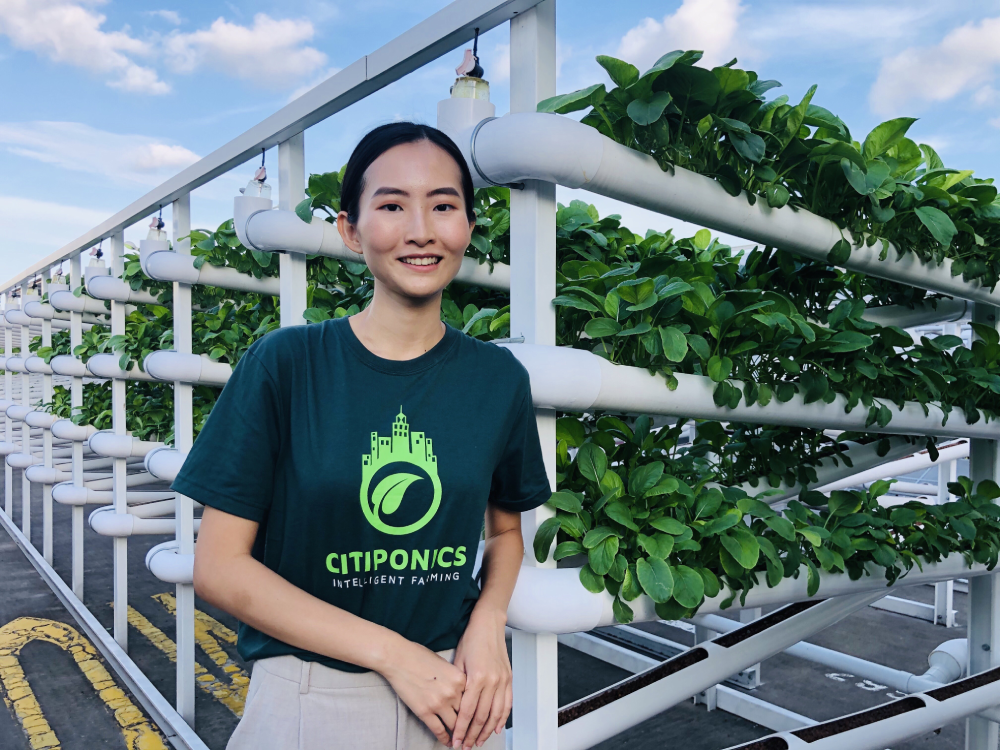 Photo courtesy of Citiponics.
Photo courtesy of Citiponics.
Chan, 26, is the co-founder of Citiponics, a company that "aims to build a community of people through education and food accessibility", and runs a farm on the rooftop of a carpark in Ang Mo Kio.
As she is young, has a background in digital technology consulting and is "not as tan", she says she often surprises people when she tells them she’s a farmer", as many still have more traditional ideas about farming without realising that it has evolved over the years.
Chan explains to me that because of Citiponics’s technology, she is able to choose when to farm, rather than being at the whims of the weather and sun.
These technologies also help farmers of today to improve productivity and make more efficient use of limited sources such as water and electricity.
Chan graduated from the National University of Singapore (NUS) with a degree in Communications and New Media just two years ago.
But she tells me she has always cared deeply about educating people about farming in Singapore, and also about redefining Singaporeans’ relationship with food.
Chan’s interest in urban farming stems from her childhood, when she grew up with most of her produce being farm-to-table and organic, as her mother owned a farm in Malaysia.
In addition to eating the produce themselves, they also provided door-to-door delivery to customers, so Chan was in a business environment involving fresh produce when she was younger.
When in university, she participated in the NUS Overseas Colleges programme, which saw her spending a year in New York.
While she was there, it was the first time she needed to buy her own vegetables, and she realised she didn’t know where they were coming from.
She began looking into the farming solutions and farming tech scene there, and also discovered local farmers’ markets, which she described as vibrant.
"I see that kind of attraction to farmers’ markets — their strong beliefs, their strong support for local produce — that’s something that I hope eventually we get to create in Singapore as well. That kind of togetherness, in terms of support for local produce."
Hopes to pass on knowledge to others
However, Chan says she’s come to realise that many of her peers in Singapore don’t have an awareness about their food sources — possibly because the majority of Singaporeans don’t grow up thinking so much about it.
"I think Singaporeans, we are great at appreciating good food. We love a good plate of chicken rice, char kway teow, the hawker centre food.
But nobody actually goes and questions where the food comes from, because we don't grow up with that kind of exposure, understanding, and awareness, because we don't even see the farms themselves."
Thus, her hope is that her work in urban farming at Citiponics can "pass this blessing" of developing this understanding on to others, so that they can also enjoy the farm-to-table experience.
Citiponics’s engagement with the community
Chan sees Citiponics’s role as contributing to the greater urban farming industry as well as to Singapore’s food security, particularly through engaging communities.
Situated in the heart of Ang Mo Kio, out in the open and surrounded by HDB blocks, Citiponics helps to bring food production closer to the community.
By farming close to the heartland, it allows the public to have access to fresh produce with a smaller carbon footprint, and helps to raise awareness and promote local produce to consumers.
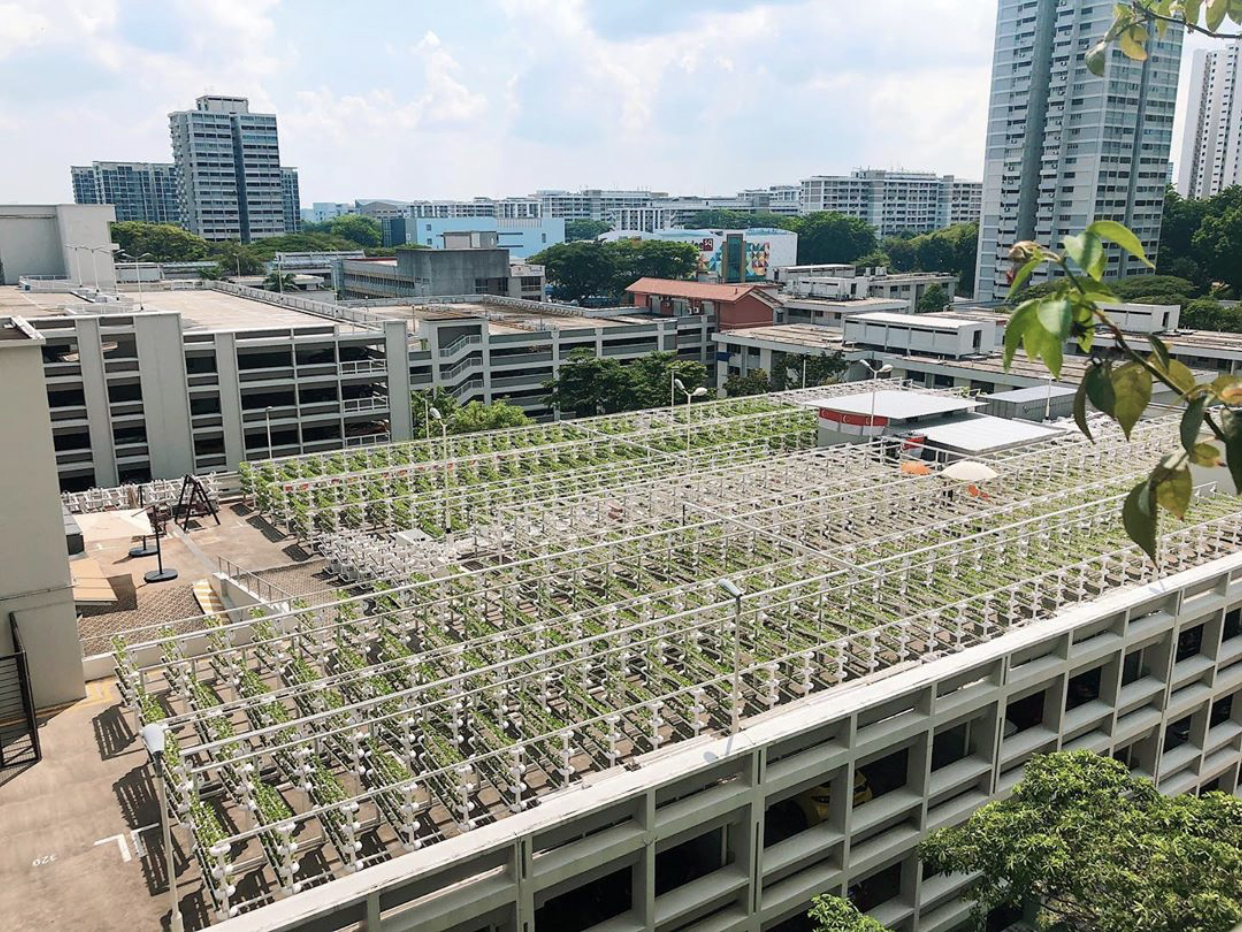 Photo courtesy of Citiponics.
Photo courtesy of Citiponics.
Citiponics’s Aqua Organic System (AOS) is designed to be well-suited for the farm’s surroundings, as the water in the system is constantly in motion, moving through the pipes. This facilitates water filtration, to ensure that the plants have sufficient water and nutrient flow, but also ensures mosquitoes can’t breed in it.
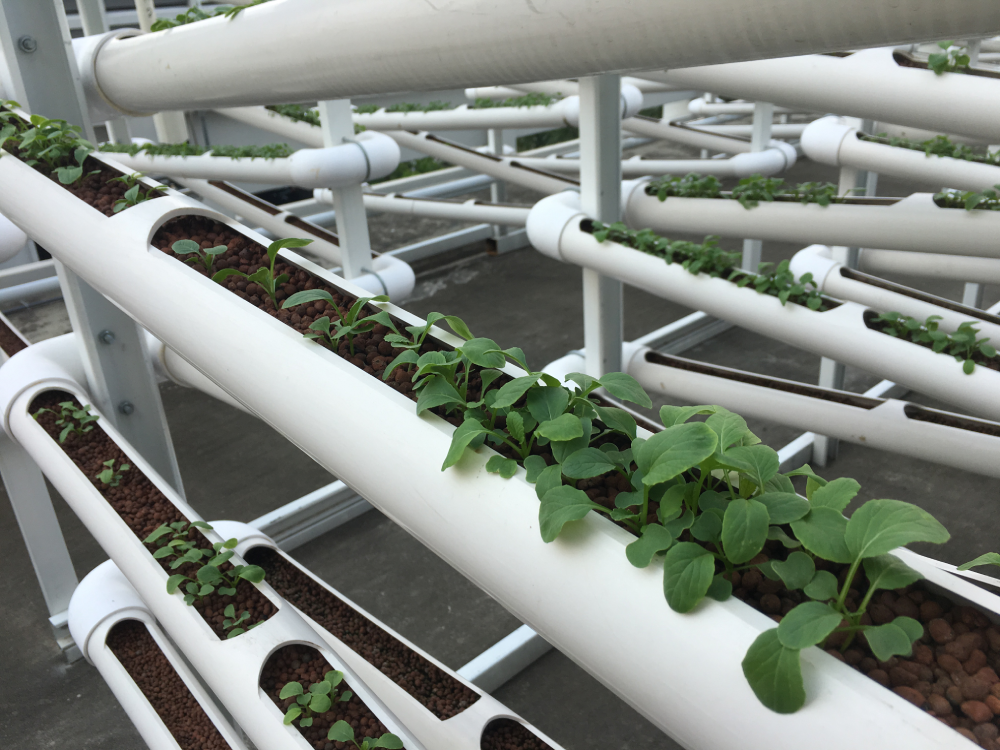 Photo by Jane Zhang.
Photo by Jane Zhang.
As Chan walks me through the farm, she tells me that the children living in the nearby HDB blocks often wave to them in the garden from the blocks above.
Citiponics supplies its produce, which mostly consists of Georgina lettuces, to selected FairPrice outlets, primarily to Ang Mo Kio Hub's FairPrice Xtra. Thus, residents are able to buy and eat the fresh vegetables they see from their own homes soon after they are harvested.
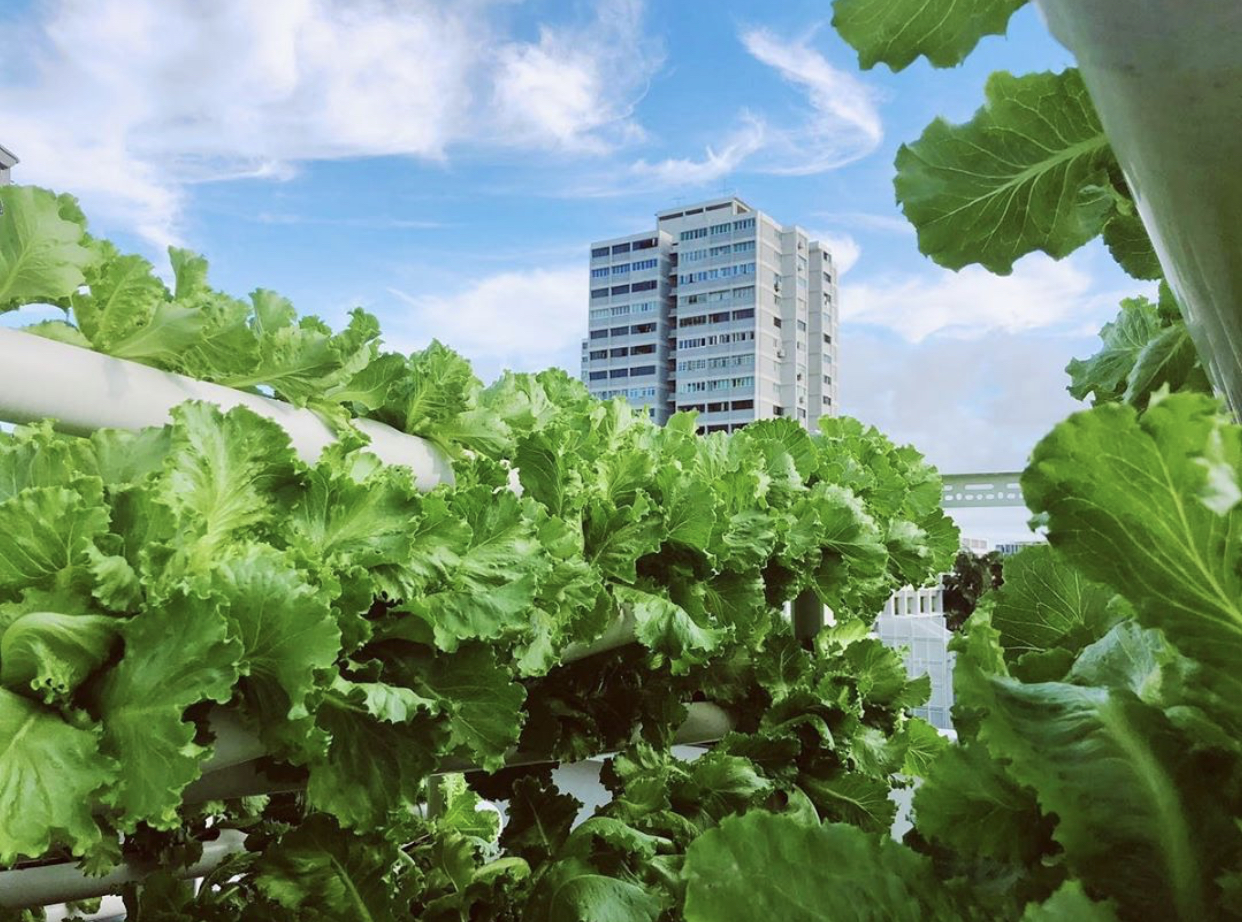 Photo courtesy of Citiponics.
Photo courtesy of Citiponics.
Citiponics has also made the fresh produce they grow even more accessible to Singaporeans by hosting community markets, the first round of which was held in January.
At these markets, customers are able to harvest their own vegetables and tour the farm, so it serves a dual purpose of educating and making locally-grown produce more accessible for those living in Singapore.
Pursued different opportunities to farm
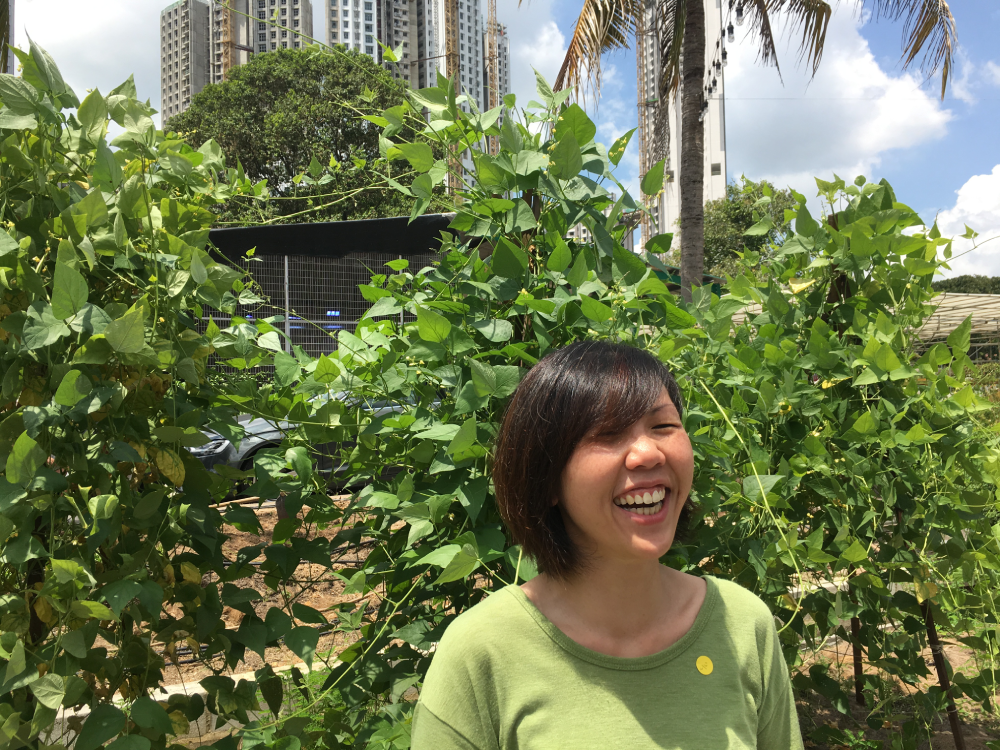 Photo by Jane Zhang.
Photo by Jane Zhang.
Unlike Chan, who has been passionate about farming since a young age, Chua admits to me that her interest did not start so early.
She laughs as she exclaims, "Not a childhood interest… because I didn’t have any green fingers in the past!"
However, that has not kept the 40-year-old from wholeheartedly pursuing and developing her passion in the past few years, most recently as a part-time staffer at Edible Garden City (EGC), a company that designs, builds and maintains commercial farms and private edible gardens around urban Singapore.
Their urban farming model is in operation in their main production farm at Queenstown, where Chua worked as part of their production team
She first became interested in farming in 2015 while in Japan for a mission trip to work on post-tsunami crisis relief.
She signed up for a farming course in Japan, but wasn’t accepted, although at the time she wasn’t aware of the existence of urban farming, or that it was done right here.
Then, in 2017, she signed up for a two-day SkillsFuture course on permaculture, which she says was extremely beneficial for her understanding of farming.
It was so integral in pushing her interest that at the end of that year, she even signed up for a two-week permaculture course in Australia, which she attended in July 2019.
When she returned to Singapore, Chua got connected to EGC through a colleague’s brother, and knew immediately that she wanted to get involved.
Experience working at EGC
Up to just a couple weeks prior to my meeting with her, Chua was working at EGC twice a week, on Tuesdays and Thursdays, splitting her time between EGC and her role as a compliance officer.
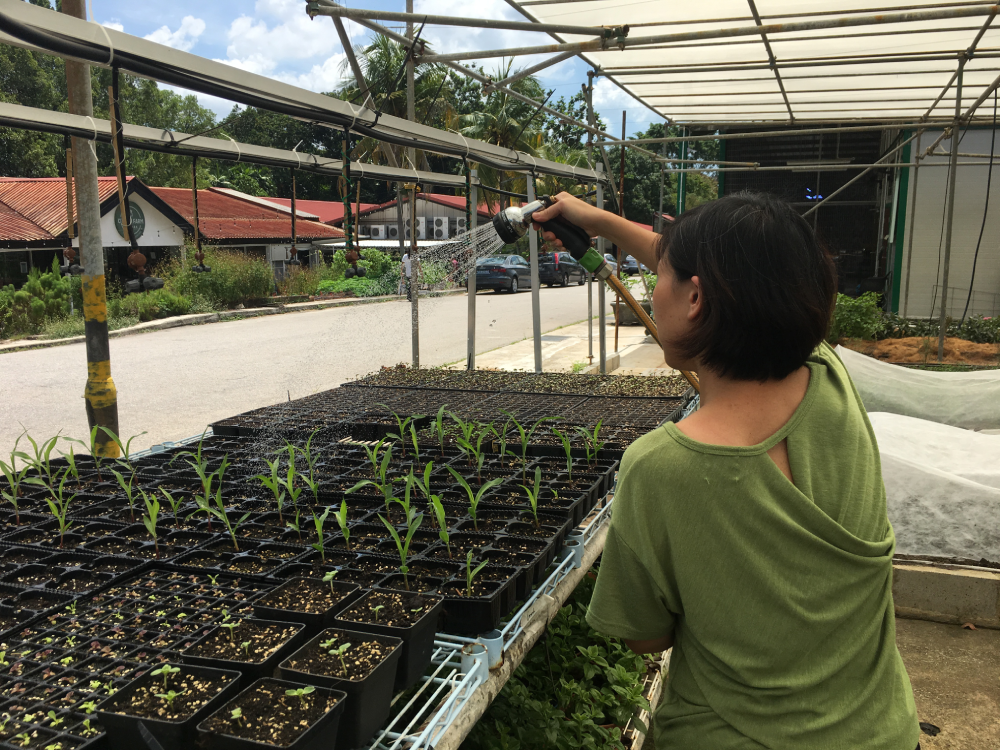 Photo by Jane Zhang.
Photo by Jane Zhang.
Her days started at 7:30am, when she and the rest of the production team would harvest the produce and herbs to be sent to the restaurants EGC works with.
The morning would then be spent packing and checking on the quality of everything prior to delivery, as well as general maintenance work such as checking for pests, weeding, and pruning.
After lunch, which the team would usually go for together, it would be time to go back to whatever maintenance work she had been tasked to do, as well as tending to some of the other indoor plants, such as the hydroponics system and the soil-based indoor growing plants.
Chua’s passion for and enjoyment from working at EGC is overwhelmingly apparent throughout our interview.
She tells me very earnestly, when I ask, that she has no least favourite task, and that she genuinely enjoys every single aspect of her role.
Relationships formed at EGC
And when I ask Chua about how she would describe the relationships she formed at EGC, she responds thoughtfully, "I only have one word, but this word is good enough already. It’s called — 'good'".
She raves about the people she works with, and how much she has gained from her time there.
"They have been such wonderful mentors here to me. So I’ve really learned a lot from them."
Chua has clearly formed a community for herself there as well, as her coworkers all exclaim joyfully when they spot her sitting at the pantry during our interview.
At one point, we pause for a few moments as the EGC team excitedly digs into a box of muffins Chua brought for them, with everyone asking her how she has been.
She explains that it is her first time back to the farm in three weeks, as she recently stopped part-timing at EGC because she has shifted back to working full-time, in order to save up money to pursue her bigger goal: to set up a farm.
In the meantime, she will continue work in a small home planter she owns, where she utilises the skills that she learned from working at EGC to grow kale, mani cai, basil, cranberry hibiscus, Mexican tarragon, lime, mulberry, and more.
She tells me that she is also trying to secure a plot of land at the Bukit Gombak community gardens, as well as one below her own home, to continue the urban farming work she has been doing.
Contributing to Singapore’s food supply
Chua is passionate about the idea of creating our own food supply, and working within constraints to find creative solutions:
"We are able to grow our own food, if we have the space and all that. If we don’t have the space, then we try to create the space."
Why?
"Because it’s fun! First, it’s fun when you grow your stuff, and when you eat from what you grow, it’s actually very satisfying.
And secondly, it has to do with going back to the basics. Actually, in the days of our forefathers, they are all working on the ground.
So, to me... we should go back to the basics to work to grow our own food."
Similarly, Chan feels this work is important, in light of issues such as the global population growth rate, climate change, and water scarcity:
"It's very meaningful when I get to contribute to this kind of food security and sustainability issue with innovative technology that can help to contribute to an issue that's bigger than myself. Because I think food security and food sustainability is… a global issue.
I think it's great that when I do such a thing, or when Citiponics does such a thing, we get to work with a lot of industry players, or help raise awareness for this important innovation.
And then we get to have more industry players to come in and contribute to the solution."
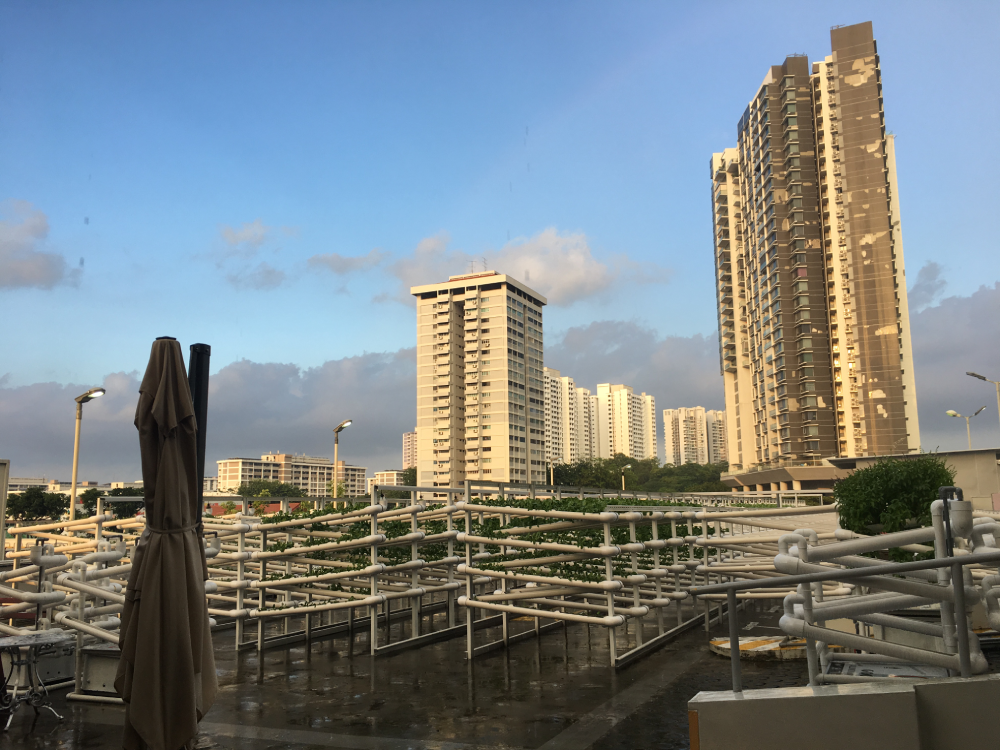 Photo by Jane Zhang.
Photo by Jane Zhang.
Path moving forward
Initiatives such as Citiponics’s urban rooftop farm will soon be able to expand further, as the government is working to further enable farms like theirs to increase their impact.
In this year’s Committee of Supply (COS) debates, Minister for the Environment and Water Resources Masagos Zulkifli announced that SFA will be making 16 rooftop spaces on HDB multi-storey car parks across the island available for more urban farming in community spaces.
The newly-available area will total over 30,000 square metres.
Chan also says she feels this is an exciting time for farming, pointing to the government’s vision for Singapore to produce 30 per cent of our own nutritional needs by the year 2030:
"I think that they are becoming a focus right now for this year, so I feel that with these kinds of opportunities and the kinds of strategies that are being shared with us, we do think that there is a possibility to turn all these challenges into opportunities, these kinds of creative ways."
Most importantly, though, the change can only happen if more everyday Singaporeans begin seeing the value of buying local and supporting local produce, says Sarah Rodriguez, an EGC staffer.
And that change, she tells me, can start with greater awareness and education:
"I think it’s important for the education system to catch up, for people to understand the full potential of local produce.
And once there’s that, definitely people will want to be farmers, people will want to buy local, and the industry will really boom, and then you won’t have a problem in terms of finding manpower, finding demand, because there will be that foundation already.
And then it will feed to food security."
This awareness can be developed through efforts such as SFA’s new local produce logo.
To help consumers better identify local produce, SFA recently unveiled a new local produce logo, which will be rolled out on the packaging of local produce in August 2020.
A new Clean & Green Standard will also be developed to recognise urban farms that harness resource-efficient technologies and incur smaller carbon footprints.
These initiatives will raise the profile of local produce and help garner support to 'buy local, eat local'.
One way for people to get involved is through the newly-announced Citizen’s Workgroup, which aims to work with participants to co-create solutions in order to increase the demand for local produce.
And for those who are keen to further their education in the field, SFA has worked with NTU to launch a new Food Science & Technology post-grad certificate programme at the end of this year. The new programme will include topics such as urban agriculture-post harvest and novel food.
In the last two years, SFA has also collaborated with Temasek Polytechnic and Republic Polytechnic to implement two SkillsFuture Earn and Learn Programmes leading to diplomas in Aquaculture and Urban Agricultural Technology respectively.
These types of programmes will help build a new generation of people that is equipped with the knowledge and skills to support Singapore’s growing agri-food industry.
And while the farming community may currently be small, Rodriguez is hopeful that it is growing, and that the small group of passionate people will continue to grow the future of farming in Singapore:
"I think it's a good underlying humming that's happening in Singapore, where people are really, from the ground up, pushing this farming initiative — not only us but a lot of other farms and farming collectives, like Ground-up Initiative, that run mainly with volunteers.
Singaporeans are rising to the challenge. It's quite a small group, but they are very, very, very passionate. So it's very motivating to see".
This sponsored article brought to you by Singapore Food Agency made the author want to go eat a salad.
Top photos by Jane Zhang and courtesy of Citiponics.
If you like what you read, follow us on Facebook, Instagram, Twitter and Telegram to get the latest updates.
